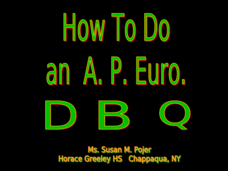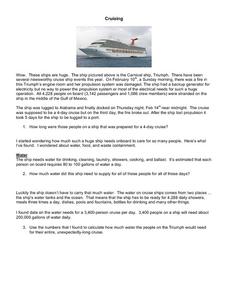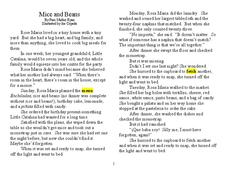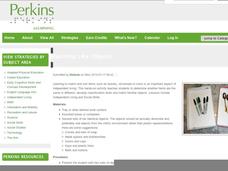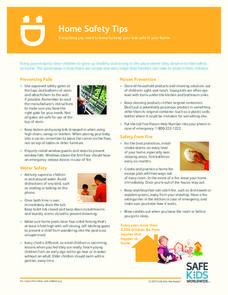Curated OER
Scientific Method, Control and Variables
Middle school scientists bathe in Bikini Bottom with SpongeBob and friends. They define steps in the scientific method. They identify independent variables, dependent variables, and the control for science experiments being carried out...
Curated OER
Community Helpers
First graders explore the different products and services provided by community helpers. For this community helpers lesson, learners participate in a role playing activity where the students transform into community helpers. They break...
Curated OER
The Adventures of Tom Sawyer: Study Help Essay Questions
Use these study questions to test your class on The Adventures of Tom Sawyer by Mark Twain. These mostly higher-level questions have the potential to be test questions, discussion questions, homework questions, or essay questions. The...
Curated OER
How To Do an AHAP DBQ
How is an essay like a hamburger? Detailing the "meaty" parts of a well-written essay, this presentation takes students through the process of using a strong thesis statement to write a thorough and engaging response to a Document Based...
Curated OER
How To Do an AP Euro DBQ
Are your AP classes struggling with Document Based Questions? Nip their problems in the bud with this clear and comprehensive presentation, which compares a "dazzling DBQ" to a hamburger, outlining all of the layers therein....
Curated OER
Introduce Vocabulary: Make Way for Ducklings (McCloskey)
Use the Caldecott Award-winning book Make Way for Ducklings by Robert McCloskey (which can be found on YouTube if you don't have it) to guide budding readers through vocabulary in context. Although the...
Curated OER
Cruising
Cruise ships offer many engaging opportunities for real-world math adventures. These large, floating cities use resources with numbers into the thousands place. Young mathematicians are asked to calculate numerical information...
Debra J. Herman
The Blue Room by Susanne Valadon
Nearly anything can inspire art. Analyze The Blue Room by Susanne Valadon to help your learners understand that art is everywhere. They'll discuss the line, shape, color, and mood of the piece while attempting to better grasp its...
Mrs. Mann
Mice and Beans
A great addition to a multicultural unit or curriculum study, use the set of questions based on Pam Muñoz Ryan's Mice and Beans to engage learners and enhance their reading experience. As youngsters read, they...
National Institute of Food and Agriculture
Water Pollution Demonstration
Water pollution is everywhere, and pollutants range from oil to fertilizers. Bring the concept to life by demonstrating the difficulties in getting particular pollutants out of water.
DiscoverE
Sorting Solutions
It's okay to play with your food—just this once! Scholars design and create meshes and chutes to sort pasta by size and shape. They test their designs and make improvements as necessary.
DiscoverE
Slime!!
Who's going to get slimed? Your entire class! Scholars create slime using Borax, water, and white glue. Some food coloring can give the slime a bit of color.
American Museum of Natural History
Be a Water Saver
Everyone must do their part to make a difference. The lesson link provides an 11-item questionnaire to reflect on conservation practices. Simple and straightforward, the lesson is perfect as a remote learning resource or as a tool for an...
Curated OER
Earth's Water: A drop in your cup
Students complete activities where they observe the amount of freshwater in the world as a fraction of the actual amount of water using different mixtures. In this freshwater lesson plan, students brainstorm on how to preserve...
Perkins School for the Blind
Matching Like Objects
Same and different, sorting, and tactile discrimination are what's on the agenda for today. The class practices sorting objects and attempts to determine which objects are the same and different and why. The purpose is to increase...
Perkins School for the Blind
I'm Thinking Of...
Learning how to describe an object or a person is a great way to develop verbal and written expression. Learners with special needs improve their verbal expressive skills and concept development skills while playing a guessing game. The...
K12 Reader
What Happens Next?
While your students may not be psychics, that doesn't mean they can't predict what will happen next in a story. To hone this important reading comprehension skill, young learners read a series of three short...
Positively Autism
Bedtime Routine Picture Cards
Clean up toys, brush teeth, get in bed. Here's an excellent idea that can be used to make evenings so much easier and foster self-efficacy skills in learners of any ability level or age.
Positively Autism
Morning Routine Picture Cards
Mornings can be a challenge. There's so much to remember do in so little time. Foster self-efficacy skills in learners of any ability level or age and reduce stress with these morning routine picture cards.
Safe Kids Worldwide
Home Safety Tips
Stay safe all year long with a list of safety tips for the home. With pointers about preventing burns, water safety, keeping medication away from children, and poison prevention, among others, the resource is valuable for anyone invested...
Constitutional Rights Foundation
Women in the Military
Scholars analyze the role of women in the military in United States history. Using group research, debate, and diary entries, they explore various military activity in America. To complete the lesson, young historians write an essay...
Curated OER
"Cereal" Comic Strip
Young scholars discuss how wheat is important to our everyday lives, from food to insulation, focusing on how wheat grains are processed into food items. Students then create a comic strip of the steps of processing grain to demonstrate...
Curated OER
Week 3: Pollution Source and Effects
Lab groups set up an experiment to observe what happens over time in collected pond water when fertilizer, representing pollution, is added. This website does not include student lab sheets, but background information, materials, and...
Curated OER
Describe Environmental Interrelationships
Students describe environmental interrelationships using list of criteria. They are able to explain organism interaction, based on definitions provided. Also, students can use references and worksheets, to describe effects of pollution...
Other popular searches
- Doing Laundry
- Laundry Detergents
- How to Do Laundry
- Laundry Skills
- </I>the Laundry News</i>
- Laundry Activities
- Steps Doing Laundry
- Laundry Process
- Bottles Laundry
- Skills Doing Laundry
- Life Skills Laundry
- Steps to Doing Laundry




